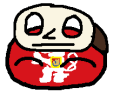Not to be confused with
Libertarian Socialism or
Social Liberalism.
Liberal Socialism (Libsoc) is an economically centre-left to left-wing political theory and ideology that believes that ![]() Socialism is compatible with
Socialism is compatible with ![]() Liberalism. There is no one conception of what Liberal Socialism is, but rather, many different (sometimes contradictory) definitions.
Liberalism. There is no one conception of what Liberal Socialism is, but rather, many different (sometimes contradictory) definitions.
Conceptions
 As Liberal Mixed Economy
As Liberal Mixed Economy
Liberal Socialism can sometimes mean liberalism which operates through a robust mixed economy, without intentions of transferring to a fully socialist system. This often pans out as a slightly more left wing version of what is otherwise indistinguishable from ![]() Social Liberalism or
Social Liberalism or ![]() Social Democracy.
Social Democracy.
 As Socialist Liberal Democracy
As Socialist Liberal Democracy
Alternatively, Liberal Socialism can mean a ![]() Liberal Democracy that would have a
Liberal Democracy that would have a ![]() Market Socialist economy, or a
Market Socialist economy, or a ![]() Democratic Socialist society that would have free markets, minimal regulations, and very few (if any) planning.
Democratic Socialist society that would have free markets, minimal regulations, and very few (if any) planning.
 As Liberal/Socialist Reform
As Liberal/Socialist Reform
Another way of looking at liberal socialism is as an attempt to reform a liberal economy into a fully socialist one, or alternatively, as the liberalization of a centralized ![]() State Socialist government.
State Socialist government.
 As Historiography
As Historiography
Liberal Socialism can be seen as a view of history as going from ![]() Feudalism to
Feudalism to ![]() Liberalism, and then Finally to
Liberalism, and then Finally to ![]() Socialism. This conception tends to view
Socialism. This conception tends to view ![]() Socialism as the best way carry on the
Socialism as the best way carry on the ![]() Classical Liberal principles of
Classical Liberal principles of ![]() Equality and
Equality and ![]() Liberty.
Liberty.
 Liberalism as Socialism
Liberalism as Socialism
Liberal socialism can also be seen as using the ![]() Liberal philosophy that the liberty of man should not be offended and that a person should not be treated as means but as ends, extended to the economy, combined to prove socialist standpoints.
Liberal philosophy that the liberty of man should not be offended and that a person should not be treated as means but as ends, extended to the economy, combined to prove socialist standpoints.
History
 Germany
Germany
Main article:
Bernsteinism
In Germany, liberal socialist ideals can be said to originate with the development of revisionist Marxism of Eduard Bernstein who defined the term 'socialism' as 'Organised Liberalism'.
 United Kingdom
United Kingdom
In Great Britain, the development of Liberal Socialism can be traced back to a number of sources of liberal and socialist origin. Liberal Socialism of liberal origin can be found in the theories of the political economist John Stuart Mill, who greatly influenced the political ideology of ![]() Social Liberalism which is a type of liberalism that believes that economic freedom can be only achieved through an extensive social state. Although, Mill is noted as going a step further, favoring collectivized workplaces. He theorized that
Social Liberalism which is a type of liberalism that believes that economic freedom can be only achieved through an extensive social state. Although, Mill is noted as going a step further, favoring collectivized workplaces. He theorized that ![]() capitalist societies shall experience a
capitalist societies shall experience a ![]() gradual process of socialization with worker cooperatives slowly replacing private enterprises.
gradual process of socialization with worker cooperatives slowly replacing private enterprises.
John Mill's liberal socialism did not completely abolish capitalism and replace it with socialism, but it supported a mixed economy based on market socialism, including social ownership of private property and capital. Liberal socialists generally do not support centralism or socialism in the form of the state, but support the realization of property collectivization through market socialism of individual workers' cooperatives. This form of workers' community cooperatives can be seen as a manifestation of Liberalism: everyone can join according to their own free will, but if it is not conducive to their own self-development, individuals can leave at any time. Liberal socialists believe that the introduction of collective property eliminates the dependence on workers and employers, thus bringing real freedom to workers. English liberal socialists believe that freedom and equality are mutually compatible and interdependent, and regard the material inequality produced by capitalism as one of the main reasons for the increasingly lack of freedom. Free socialists also generally support the free market, and believe that market monopoly is the inevitable result of capitalism, and only through market socialism can the real free market be achieved.
Liberal socialism of socialist origin in Britain can be found in the theories of the ![]() Christian Socialist historian and activist Richard Henry Tawney, who developed a theory of 'Ethical Socialism'. Ethical socialism as a movement saw to justify socialism on ethical and moral grounds, as opposed to material grounds.
Christian Socialist historian and activist Richard Henry Tawney, who developed a theory of 'Ethical Socialism'. Ethical socialism as a movement saw to justify socialism on ethical and moral grounds, as opposed to material grounds.
Tawney later joined, influenced, and became an executive of the socialist think tank of the Fabian Society which was a group that wanted to achieve ![]() Socialism through
Socialism through ![]() reformist means in
reformist means in ![]() democracies (
democracies (![]() Democratic Socialism.) The ideology of the Fabian Society (Fabianism) may, in turn, be characterized as a form of liberal socialism.
Democratic Socialism.) The ideology of the Fabian Society (Fabianism) may, in turn, be characterized as a form of liberal socialism.
The term 'Liberal Socialism' was later used by the British economist ![]() John Maynard Keynes to describe his political ideology:[3]
John Maynard Keynes to describe his political ideology:[3]
The question is whether we are prepared to move out of the
nineteen-century laissez-faire state into an era of liberal socialism, by which I mean a system where we can act as an organized community for common purposes and to promote economic and social justice, whilst respecting and protecting the individual – his freedom of choice, his faith, his mind and its expression, his enterprise, and his property.
John Maynard Keynes, Collected Writings, volume 2, page 500
 Italy
Italy
The term 'Liberal Socialism' was popularised by the Jewish-Italian political leader Carlo Rosselli who was influenced both by Eduard Bernstein and by the British Labour movement. Carlo Rosselli rejected the political theories of ![]() Marx and favoured
Marx and favoured ![]() non-Marxist socialism. He believed that
non-Marxist socialism. He believed that ![]() liberal democracy is not just important for socialist construction, but also for its realization. Additionally, Carlo Rosseli founded Justice and Liberty (Italian: Giustizia e Libertà) which was a resistance movement against the
liberal democracy is not just important for socialist construction, but also for its realization. Additionally, Carlo Rosseli founded Justice and Liberty (Italian: Giustizia e Libertà) which was a resistance movement against the ![]() Fascist government of Italy.
Fascist government of Italy.
 Hungary File:Nagy3.png
Hungary File:Nagy3.png
W.I.P
 Czechoslovakia
Czechoslovakia 

Socialism with a Human Face (SwHF) was a term coined by ![]() liberal socialist Radovan Richta to describe the beliefs of Alexander Dubček and the Communist Party of Czechoslovakia under his rule. It sought to bring about moderate liberal-democratic reforms, which put it at odds with the ideologies of the other Eastern Bloc countries. It sought to transition Czechoslovakia into a multiparty, democratic socialist state, and guarantee citizens the freedom of speech, press and movement. Socialism with a Human Face also had a distinct foreign policy, which was to seek good relations with both the Eastern Bloc, and western nations.
liberal socialist Radovan Richta to describe the beliefs of Alexander Dubček and the Communist Party of Czechoslovakia under his rule. It sought to bring about moderate liberal-democratic reforms, which put it at odds with the ideologies of the other Eastern Bloc countries. It sought to transition Czechoslovakia into a multiparty, democratic socialist state, and guarantee citizens the freedom of speech, press and movement. Socialism with a Human Face also had a distinct foreign policy, which was to seek good relations with both the Eastern Bloc, and western nations.
Socialism with a Human Face believed that highly authoritative and centralized policies were no longer needed in Czechoslovakia, as the bourgeois class had already been defeated and done away with. It also sought to modernize Czechoslovakia, and have it join the rest of the world in terms of scientific and technological advancements. Moreover, SwHF believed that the proletariat must not only be liberated from the exploitation of the bourgeoisie, but also that socialism "must make more provisions for a fuller life of the personality than any bourgeois democracy."
In response to Dubček's reforms, the Soviet Union and supporting members of the ![]() Warsaw Pact invaded Czechoslovakia. This caused a rift in Communist movements around the world, and the legacy of the invasion led to the actualization of
Warsaw Pact invaded Czechoslovakia. This caused a rift in Communist movements around the world, and the legacy of the invasion led to the actualization of ![]() Eurocommunism.
Eurocommunism.
 United States
United States
In the United States, the term 'Liberal Socialism' was used by the political theorist John Rawls to describe his political ideology.
In the United States a type of Liberal Socialism was espoused by the ![]() anarcho-syndicalist thinker Noam Chomsky. In his book On Anarchism claiming that
anarcho-syndicalist thinker Noam Chomsky. In his book On Anarchism claiming that ![]() libertarian socialism to be conclusion of
libertarian socialism to be conclusion of ![]() classical liberal principles:[4]
classical liberal principles:[4]
These ideas grow out of the
Enlightenment Thought; their roots are in Rousseau’s Discourse on Inequality, Humboldt’s Limits of State Action, Kant’s insistence, in his defense of the
French Revolution, that freedom is the precondition for acquiring the maturity for freedom, not a gift to be granted when such maturity is achieved. With the development of
industrial
capitalism, a new and unanticipated system of injustice, it is
libertarian socialism that has preserved and extended the radical humanist message of the Enlightenment and the
classical liberal ideals that were perverted into an ideology to sustain the emerging social order. In fact, on the very same assumptions that led classical liberalism to oppose the intervention of the state in social life, capitalist social relations are also intolerable. This is clear, for example, from the classic work of Humboldt, The Limits of State Action, which anticipated and perhaps inspired Mill and to which we return below. This classic of liberal thought, completed in 1792, is in its essence profoundly, though prematurely, anticapitalist. Its ideas must be attenuated beyond recognition to be transmuted into an ideology of industrial capitalism.
Humboldt’s vision of a society in which social fetters are replaced by social bonds and labor is freely undertaken suggests the early
Marx, with his discussion of the “alienation of labor when work is external to the worker ... not part of his nature ... [so that] he does not fulfill himself in his work but denies himself ... [and is] physically exhausted and mentally debased,” alienated labor that “casts some of the workers back into a barbarous kind of work and turns others into machines,” thus depriving man of his “species character” of “free conscious activity” and “productive life.” Similarly, Marx conceives of “a new type of human being who needs his fellow-men.... [The workers’ association becomes] the real constructive effort to create the social texture of future human relations.” It is true that classical libertarian thought is opposed to state intervention in social life, as a consequence of deeper assumptions about the human need for liberty, diversity, and free association. On the same assumptions, capitalist relations of production, wage labor, competitiveness, the ideology of “possessive individualism”—all must be regarded as fundamentally antihuman. Libertarian socialism is properly to be regarded as the inheritor of the liberal ideals of the Enlightenment.
Rudolf Rocker describes modern anarchism as “the confluence of the two great currents which during and since the French revolution have found such characteristic expression in the intellectual life of Europe: Socialism and Liberalism.” The classical liberal ideals, he argues, were wrecked on the realities of capitalist economic forms. Anarchism is necessarily anti-capitalist in that it “opposes the exploitation of man by man.” But anarchism also opposes “the dominion of man over man.” It insists that “socialism will be free or it will not be at all. In its recognition of this lies the genuine and profound justification for the existence of anarchism.” From this point of view, anarchism may be regarded as the libertarian wing of socialism. It is in this spirit that Daniel Guérin has approached the study of anarchism in Anarchism and other works.
Noam Chomsky, On Anarchism
A similar view has been espoused by the American BreadTuber VaushV.[5] Leading to liberal socialism to be sarcastically called Vaushism within the Polcompball community.
When Marx and following theorists wrote on capitalism they weren't writing 'capitalism and liberalism are worst things to ever happen to humanity, they are the greatest oppression of workers'. No. Marxism is supposed to be an extension of liberalism not a rejection of it, a true promotion of unity, fraternity, and freedom, and liberty, and shit. That's what Marxism and that's what leftism is about, it's about bringing the messaging of the liberal movement forward, to make it better, to make it get stronger, to make it true to its principles.
 South Africa
South Africa
Anti-Apartheid revolutionary and South Africa's first black leader,
![]() Nelson Mandela ideologically self-identified as a Socialist and ultimately believed in a classless society, having been influenced by
Nelson Mandela ideologically self-identified as a Socialist and ultimately believed in a classless society, having been influenced by ![]() Marxism. But when in power he supported the country's
Marxism. But when in power he supported the country's ![]() liberal democratic model, while still taking strong measures to combat poverty, encourage land reform, and expanding healthcare services. He expressed desires to move to a
liberal democratic model, while still taking strong measures to combat poverty, encourage land reform, and expanding healthcare services. He expressed desires to move to a ![]() social-democratic economy but figured that it wasn't possible due to the circumstances at the time (the fall of the USSR and the ascendency of
social-democratic economy but figured that it wasn't possible due to the circumstances at the time (the fall of the USSR and the ascendency of ![]() neoliberalism.)
neoliberalism.)
 Brazil
Brazil
WIP
 Soviet Union/
Soviet Union/ Russia
Russia 
Mikhail Gorbachev was the last general secretary of the USSR who oversaw the demise of the Soviet Empire. Gorbachev was a compromised general secretary who rose to power when the USSR was already suffering economic stagnation, supply shortages, sing the mounting costs of Brezhnev’s Afghan war. In his tenure, he implemented a series of reforms, including perestroika, glasnost, new political thinking, withdrawal from Afghanistan, and the abandonment of the Brezhnev Doctrine. The market socialist reforms that he tried to drew from the experiences of ![]() SFRY,
SFRY, ![]() Hungary, and
Hungary, and ![]() China, failed miserably and the Soviet production collapsed.
China, failed miserably and the Soviet production collapsed.
The pullout of troops from Afghanistan and Eastern Europe was also mishandled. This led to the collapse of the communist regimes in Eastern Europe and the Revolutions of 1989, along with the Islamist takeover of Afghanistan. In 1991, the Soviet hardliners who opposed his reforms saw his proposal to change the USSR into a confederation as undesirable and “treason.” They launched the infamous “August Coup,” which tried to restore the Soviet Empire, which effectively made Gorbachev powerless since then. This gave the rise of ![]() Boris Yeltsin, who subsequently declared the end of the USSR, along with other separatist nationalist leaders.
Boris Yeltsin, who subsequently declared the end of the USSR, along with other separatist nationalist leaders.
Variants
 Huism
Huism
In the 1980s, the Chinese government countered some political prisoners convicted during the Cultural Revolution, and then opened small-scale freedom of speech. The Chinese intellectuals, represented by Wei Jingsheng, immediately carried out a lot of criticism activities against the government on the west wall of Beijing, mainly focusing on greater freedom of expression, removing official corruption, adjusting prices, and preventing inflation. However, Hu Yaobang, the implementer of the reform, was forced to resign in 1986 and then triggered a large-scale democratic movement after his death in 1989. At that time, the senior officials of the CPC Central Committee were divided into two groups, one group supported the student movement for freedom, and the other group demanded to suppress the student movement. In the end, ![]() Zhao Ziyang, the then General Secretary of the CPC Central Committee, lost Deng Xiaoping's support. Liberals in the party, such as
Zhao Ziyang, the then General Secretary of the CPC Central Committee, lost Deng Xiaoping's support. Liberals in the party, such as ![]() Xi Zhongxun, lost power, and many people were expelled from the top of the CPC. The democratic movement in 1989 was finally bloody suppressed. Hu Yaobang's liberalization reform, as well as Hu Yaobang's ruling ideology, is considered a kind of free socialism. However, this reform has not carried out more liberalization of the economy due to the obstructions of conservatives like
Xi Zhongxun, lost power, and many people were expelled from the top of the CPC. The democratic movement in 1989 was finally bloody suppressed. Hu Yaobang's liberalization reform, as well as Hu Yaobang's ruling ideology, is considered a kind of free socialism. However, this reform has not carried out more liberalization of the economy due to the obstructions of conservatives like ![]() Chen Yun and
Chen Yun and ![]() Li Peng. Jiang Zemin later completed the task of economic liberalization. But at that time, the Chinese people did not live better, the problem of corruption was more serious, and the political oppression was more serious.
Li Peng. Jiang Zemin later completed the task of economic liberalization. But at that time, the Chinese people did not live better, the problem of corruption was more serious, and the political oppression was more serious.
 American Social Democracy
American Social Democracy
American Social Democracy refers to the ![]() American variant of
American variant of ![]() social democracy. It is the
social democracy. It is the ![]() left-wing version of social democracy which is
left-wing version of social democracy which is ![]() left-populist.
left-populist.
 Left Anti-Communism
Left Anti-Communism
Left Anti-Communism is the left-wing version of anti-communism that is critical of communist regimes from a left-wing point of view. Although, not all are opposed to communism, just what they see as "state capitalism". It's also used as a pejorative term for socialists that are critical of authoritarian socialism and examples of authoritarian socialism.
 Ethical Socialism
Ethical Socialism
Ethical Socialism is a political philosophy that appeals to socialism on ethical and moral grounds as opposed to consumeristic, economic, and egoistic grounds. It emphasizes the need for a morally conscious economy based upon the principles of altruism, cooperation, and social justice while opposing possessive individualism. Ethical socialism has some significant overlap with Christian socialism, Fabianism, guild socialism, liberal socialism, social-democratic reformism, and utopian socialism. Under the influence of politicians like Carlo Rosselli in Italy, social democrats began disassociating themselves from orthodox Marxism altogether as represented by Marxism–Leninism, embracing an ethical liberal socialism, Keynesianism, and appealing to morality rather than any consistent systematic, scientific or materialist worldview
How to Draw

Liberal socialism's symbol is a crossed hammer and quill, the symbol of the Czech National Social Party and of the Radical Civic Union which were historically regarded as liberal socialist parties. The symbols of the hammer and quill represent solidarity between workers and clerks.
- Draw a ball
- Draw a red hammer and a feather crossed
- Add the eyes and you're done!
| Color Name | HEX | RGB | |
|---|---|---|---|
| Red | #D00505 | 208, 5, 5 | |
| White | #FFFFFF | 255, 255, 255 | |
Relations
Friends
 Bernsteinism - One of my oldest friends.
Bernsteinism - One of my oldest friends. Civil Libertarianism - Hooray for human rights!
Civil Libertarianism - Hooray for human rights! Democratic Socialism
Democratic Socialism  - We're lowkey the same.
- We're lowkey the same. Market Socialism - We are very similar with some minor differences.
Market Socialism - We are very similar with some minor differences. Progressivism - We often take a similar view of history, and tend to have a similar commitment to reform.
Progressivism - We often take a similar view of history, and tend to have a similar commitment to reform. Ricardian Socialism - Weird friend, but I love them anyway.
Ricardian Socialism - Weird friend, but I love them anyway. Social Democracy - You are so close, just be a lil bit more like your dad.
Social Democracy - You are so close, just be a lil bit more like your dad. Socialism with a Human Face - Good try buddy! To bad it didn't work out.
Socialism with a Human Face - Good try buddy! To bad it didn't work out. Twitterism - A lot of your users are literally me!
Twitterism - A lot of your users are literally me! Left-Wing Populism - LULALÁ 2022 QUE O PT GOVERNE MEU PAÍS PRA SEMPRE!
Left-Wing Populism - LULALÁ 2022 QUE O PT GOVERNE MEU PAÍS PRA SEMPRE!
Frenemies
 Social Liberalism - I like your liberal principles and focus on welfare but you focus too much on preserving capitalism. Mill was still based though, and we sometimes still overlap in the modern day, so I definitely don't hate you.
Social Liberalism - I like your liberal principles and focus on welfare but you focus too much on preserving capitalism. Mill was still based though, and we sometimes still overlap in the modern day, so I definitely don't hate you. Liberalism - Great dad, but why capitalism?
Liberalism - Great dad, but why capitalism? Social Libertarianism - Civic rights, welfare, and regulation is good and all, but you're still far too capitalist.
Social Libertarianism - Civic rights, welfare, and regulation is good and all, but you're still far too capitalist. Capitalism - Markets are cool, but liberalism is not inherently capitalist, hope you can understand that.
Capitalism - Markets are cool, but liberalism is not inherently capitalist, hope you can understand that. Socialism - And I wish you would realize socialism also needs liberalism.
Socialism - And I wish you would realize socialism also needs liberalism. Libertarian Socialism - We are similar; you just take things a bit too far.
Libertarian Socialism - We are similar; you just take things a bit too far. Conservative Socialism - I like socialism, but conservatism, not so much.
Conservative Socialism - I like socialism, but conservatism, not so much. Fabian Socialism - I'm glad you like my ideas, but what's with the Eugenics?
Fabian Socialism - I'm glad you like my ideas, but what's with the Eugenics? Titoism - Still too authoritarian, but you're pretty tolerable when compared to other AuthLefts. Did you really have to lock up Djilas though?
Titoism - Still too authoritarian, but you're pretty tolerable when compared to other AuthLefts. Did you really have to lock up Djilas though? Marxist Feminism - I like your social justice and socialism, but you are too communist and friendly with
Marxist Feminism - I like your social justice and socialism, but you are too communist and friendly with  tankies.
tankies. Chomskyism - Idk man, you said some pretty nice things about me, but your tendency to downplay the crimes of authoritarian dictators just because they don't like the US is usually the kind of stuff I'd expect from tankies rather than a self-described left-libertarian, let alone an anarchist.
Chomskyism - Idk man, you said some pretty nice things about me, but your tendency to downplay the crimes of authoritarian dictators just because they don't like the US is usually the kind of stuff I'd expect from tankies rather than a self-described left-libertarian, let alone an anarchist. Pink Capitalism - Not a big fan of capitalism, but I do like your marketing.
Pink Capitalism - Not a big fan of capitalism, but I do like your marketing. Neoconservatism - Murderous and racist swine! But Vaush and Kwaśniewski support military interventions.
Neoconservatism - Murderous and racist swine! But Vaush and Kwaśniewski support military interventions. Hmm, maybe Trotsky was right all along?
Enemies
 Marxism–Leninism - Cringe totalitarianism and red fascist/state capitalist in denial.
Marxism–Leninism - Cringe totalitarianism and red fascist/state capitalist in denial. At least he funded ANC Nazism - You are not a socialist at all, you are just an
Nazism - You are not a socialist at all, you are just an  illiberal authoritarian who's also racist!
illiberal authoritarian who's also racist! Khrushchevism - WHY THE F*CK YOU HAD TO CRUSH THE HUNGARIAN REVOLUTION?! GET YOUR TANKS AWAY FROM ME!!
Khrushchevism - WHY THE F*CK YOU HAD TO CRUSH THE HUNGARIAN REVOLUTION?! GET YOUR TANKS AWAY FROM ME!! Maoism - I don’t care that you later split with the man above. I’ll never forgive you for supporting the invasion of Hungary.
Maoism - I don’t care that you later split with the man above. I’ll never forgive you for supporting the invasion of Hungary. Conservatism - Almost my complete opposite!
Conservatism - Almost my complete opposite! Fascism- Literally my complete opposite!
Fascism- Literally my complete opposite! Paleoconservatism and
Paleoconservatism and  Classical Conservatism - Your time is up, boomers!
Classical Conservatism - Your time is up, boomers! LGBT Conservatism
LGBT Conservatism  - Why do you support conservative ideas? You know they will come back to bite you.
- Why do you support conservative ideas? You know they will come back to bite you. Conservative Feminism - Maybe I should stay quiet...
Conservative Feminism - Maybe I should stay quiet... Ethnocracy
Ethnocracy 
 - Haha Apartheid go bye bye!
- Haha Apartheid go bye bye! Thatcherism - It doesn't matter if you are a liberal. You called Mandela's political party a "terrorist organisation" and refused to impose sanctions on apartheid!
Thatcherism - It doesn't matter if you are a liberal. You called Mandela's political party a "terrorist organisation" and refused to impose sanctions on apartheid! Liberal Feminism and
Liberal Feminism and  Libertarian Feminism - Female drone pilots and CEOs don't solve anything
Libertarian Feminism - Female drone pilots and CEOs don't solve anything Alt-Right - He is a good representation of everything that I oppose.
Alt-Right - He is a good representation of everything that I oppose. Objectivism - The fuck are you?!?
Objectivism - The fuck are you?!? Malemaism - Get booted from ANC!
Malemaism - Get booted from ANC! Ba'athism - Bush, Blair, wait for me...
Ba'athism - Bush, Blair, wait for me... Wałęsaism - At least I'm the President now.
Wałęsaism - At least I'm the President now. Crowderism - Hitler was not me!
Crowderism - Hitler was not me! Dengism - Let me protest you damn it!
Dengism - Let me protest you damn it!
Further Information
For overlapping ideologies see:
Literature
- Equality by
 Henry Richard Tawney
Henry Richard Tawney - Fabian Essays in Socialism by
 The Fabian Society
The Fabian Society - Evolutionary Socialism by
 Eduard Bernstein
Eduard Bernstein - On Liberty, Principles of Political Economy and On socialism by
 John Stuart Mill
John Stuart Mill - A Theory of Justice by
 John Rawls
John Rawls - The General Theory of Employment, Interest and Money by
 John Maynard Keynes
John Maynard Keynes - Keynes Against Capitalism: His Economic Case for Liberal Socialism by
 James Crotty
James Crotty - Liberal Socialism by
 Carlo Rosselli
Carlo Rosselli
Videos
- Breadtube vs Economics #1: Response to Philosophy Tube on Housing
- How Privatisation Fails: Railways
- I Ruin Apartheid by Making it Political
Articles
- Socialists Don't Want to Destroy Liberalism. We Want to Go Beyond It. by Matt McManus
- What is a "Liberal Socialist"? by Wendy Cockcroft
- How to be a Conservative-Liberal-Socialist by Leszek Kołakowski
- At the Liberal-Socialist Nexus by Paul Crider
- What is Liberal Socialism? by Matthew McManus
Wikipedia
People
 John Stuart Mill
John Stuart Mill 
 John Maynard Keynes
John Maynard Keynes 
 Bertrand Russell
Bertrand Russell 
 R. H. Tawney
R. H. Tawney 
 Karl Polanyi
Karl Polanyi 
 Eduard Bernstein
Eduard Bernstein 
 Carlo Rosselli
Carlo Rosselli 
 John Rawls
John Rawls 
 Nelson Mandela
Nelson Mandela 
 Mikhail Gorbachev
Mikhail Gorbachev 
 Alexander Kerensky
Alexander Kerensky 
 Cornel West
Cornel West 
 Alexandria Ocasio-Cortez
Alexandria Ocasio-Cortez 
 Oliver Markus Malloy
Oliver Markus Malloy 
Organizations/Parties
 Fabian Society
Fabian Society 
 Italian Action Party
Italian Action Party 
 Czech National Social Party
Czech National Social Party 
 Left Together
Left Together 
 Ratz
Ratz 
 African National Congress
African National Congress 
 Democratic Socialists of America
Democratic Socialists of America 
 Workers' Party
Workers' Party 
 All India Trinamool Congress
All India Trinamool Congress 
YouTube
Online Communities
References
- ↑ "Decreto Berlusconi", Italian Wikipedia.
- ↑ "Stratocracy in USSR", Wikipedia.org.
- ↑ "Keynes Against Capitalism: His Economic Case for Liberal Socialism" by James Crotty.
- ↑ "On Anarchism", p. 14. Noam Chomsky.
- ↑ "Vaush on Marx and following theorists", @MayToads, Twitter.com
Gallery
Portraits and Artwork
-
Old portrait
-
Credit: u/IDK_LEL, Source
Alternative designs
-
Gorbachevism
-
Socialism with a Human Face
-
Dubčekism
Comics
| | |









